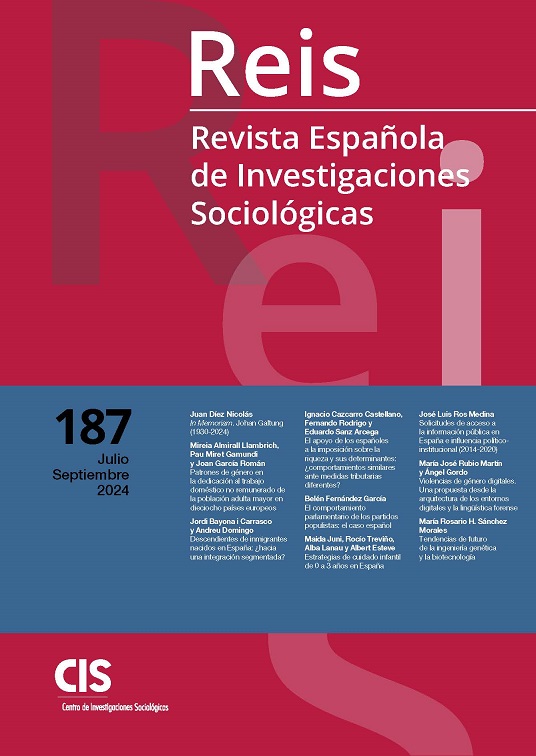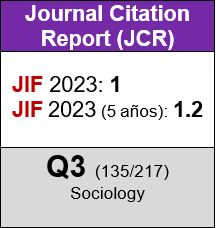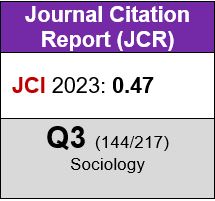Estrategias de cuidado infantil de 0 a 3 años en España
DOI:
https://doi.org/10.5477/cis/reis.187.87-106Palabras clave:
Cuidado infantil, España, Estrategias, MujeresResumen
Utilizando datos de la Encuesta Española de Fecundidad 2018 este estudio analiza las estrategias de cuidado infantil de las madres con hijos de 0 a 3 años y sus perfiles sociodemográficos. Se distinguen cuatro grupos de mujeres en función de los recursos disponibles: madres españolas con empleo y en pareja, sin empleo y en pareja, sin pareja y madres extranjeras. Los resultados muestran que la mayoría combinan alternativas para el cuidado, aunque las decisiones están sujetas a la situación laboral y familiar. Además, los modelos de regresión logística multinomial confirman que a pesar de que el cuidado formal es frecuente, el cuidado proporcionado por familiares continúa siendo relevante. Aunque los factores que influyen las estrategias familiares varían, la composición familiar es un determinante importante en las decisiones de cuidado.
Descargas
Citas
Andronescu, Cristina G. y Carnes, Matthew E. (2015). «Value Coalitions and Policy Change: The Impact of Gendered Patterns of Work, Religion and Partisanship on Childcare Policy across German States». Journal of European Social Policy, 25(2): 159-174. doi: 10.1177/0958928715573480 DOI: https://doi.org/10.1177/0958928715573480
Anxo, Dominique; Flood, Lennart; Mencarini, Letizia; Pailhé, Ariane; Solaz, Anne y Tanturri, María L. (2007). «Time Allocation between Work and Family over the Life Cycle: A Comparative Gender Analysis of Italy, France, Sweden and the United States». SSRN Scholarly Paper, N.º 1049381. doi: 10.2139/ssrn.1049381 DOI: https://doi.org/10.2139/ssrn.1049381
Arpino, Bruno; Pronzato, Chiara y Tavares, Lara (2010). «All in the Family: Informal Childcare and Mothers' Labour Market Participation». ISER Working Paper Series, No. 2010-24. Disponible en: http://hdl.handle.net/10419/65926
Baizán, Pau (2009). «Regional Childcare Availability and Fertility Decisions in Spain». Demographic Research, 21: 803-842. doi: 10.4054/DemRes.2009.21.27 DOI: https://doi.org/10.4054/DemRes.2009.21.27
Bick, Alexander (2016). «The Quantitative Role of Child Care for Female Labor Force Participation and Fertility». Journal of the European Economic Association, 14(3): 639-668. doi: 10.1111/jeea.12143 DOI: https://doi.org/10.1111/jeea.12143
Borra, Cristina y Palma, Luis (2005). «The Determinants of Child-care Choice: An Analysis for the City of Seville». doi: 10.2139/ssrn.873609 DOI: https://doi.org/10.2139/ssrn.873609
Borra, Cristina y Palma, Luis (2009). «Child Care Choices in Spain». Journal of Family and Economic Issues, 30(4): 323-338. doi: 10.1007/s10834-009-9167-6 DOI: https://doi.org/10.1007/s10834-009-9167-6
Botía-Morillas, Carmen (2019). «¿Deshaciendo o reproduciendo prácticas de género? Ambivalencias en madres primerizas y profesionales en España». Revista Española de Investigaciones Sociológicas, 166: 25-44. doi: 10.5477/cis/reis.166.25 DOI: https://doi.org/10.5477/cis/reis.166.25
Brilli, Ylenia; Del Boca, Daniela y Pronzato, Chiara D. (2016). «Does Childcare Availability Play a Role in Maternal Employment and Children's Development? Evidence from Italy». Review of Economics of the Household 14: 27-51. doi: 10.1007/s11150-013-9227-4 DOI: https://doi.org/10.1007/s11150-013-9227-4
Comisión Europea (2021). Commission Staff Working Document. Proposal for a Council Recommendation Establishing a European Children Guarantee. Disponible en: https://ec.europa.eu/social/main.jsp?langId=es&catId=1428&furtherNews=yes&newsId=10024, acceso 24 de noviembre de 2021.
Davis, Elizabeth E. y Connelly, Rachel (2005). «The Influence of Local Price and Availability on Parents’ Choice of Childcare». Population Research and Policy Review, 24: 301-334. doi: 10.1007/s11113-005-8515-y DOI: https://doi.org/10.1007/s11113-005-8515-y
Del Boca, Daniela; Locatelli, Marilena y Vuri, Daniela (2004). «Child Care Choices by Italian Households». SSRN Scholarly Paper, N.º 494084. doi: 10.1007/s11150-005-4944-y DOI: https://doi.org/10.2139/ssrn.494084
Di Gessa, Giorgio; Glaser, Karen; Price, Debora; Ribe, Eloi y Tinker, Anthea (2017). «What Drives National Differences in Intensive Grandparental Childcare in Europe?». Journals of Gerontology Series B: Psychological Sciences and Social Sciences, 71.1. doi: 10.1093/geronb/gbv159 DOI: https://doi.org/10.1093/geronb/gbv007
Dobrotić, Ivana y Vuckovic-Juros, Tanja (2016). «Who Should Finance Childcare? Multilevel Analysis of 24 Countries». Croatian Journal of Social Policy, 23: 323-357. doi: 10.3935/rsp.v23i3.1392 DOI: https://doi.org/10.3935/rsp.v23i3.1392
Esping-Andersen, Gøsta (1990). The Three Worlds of Welfare Capitalism. Princeton University Press. DOI: https://doi.org/10.1177/095892879100100108
Esquivel, Laura; Faur, Eleonor y Jelin, Elizabeth (2012). Las lógicas del cuidado infantil: entre las familias, el Estado y el mercado. Argentina IDES: UNFPA, Unicef.
Esteve, Albert; Lozano, Mariona; Boertien, Diederik; Mogi, Ryohei y Cui, Qi (2021).«Tres décadas de muy baja fecundidad en España, 1991-2018». SocArXiv. doi: 10.31235/osf.io/kch5n DOI: https://doi.org/10.31235/osf.io/kch5n
Gameren, Edwin van y Ooms, Ingrid (2009). «Childcare and Labor Force Participation in the Netherlands: The Importance of Attitudes and Opinions». Review of Economics of the Household, 7(4): 395-421. doi: 10.1007/s11150-009-9062-9 DOI: https://doi.org/10.1007/s11150-009-9062-9
González, María J. y Vidal, Sergi (2005) «Where Do I Leave My Baby? Use and Development of Early Childcare in Spain». DemoSoc Working Paper, 2005-5. Universidad Pompeu Fabra, Facultad de Ciencias Políticas y Sociales. Disponible en: http://hdl.handle.net/2072/2032
Hobson, Barbara y Bede, Luwam (2015). «Precariousness and Capabilities: Migrant Care/Domestic Workers in Two Institutional Contexts». Teorija in Praksa, 52(3): 327-349.
Huizen, Thomas van y Plantenga, Janneke (2018). «Do Children Benefit from Universal Early Childhood Education and Care? A Meta-analysis of Evidence from Natural Experiments». Economics of Education Review, 66: 206-222. doi: 10.1016/j.econedurev.2018.08.001 DOI: https://doi.org/10.1016/j.econedurev.2018.08.001
Jappens, Maaike y Bavel, Jan van (2012). «Regional Family Norms and Childcare by Grandparents in Europe». Demographic Research, 27: 85-120. Disponible en: https://www.jstor.org/stable/26349918 DOI: https://doi.org/10.4054/DemRes.2012.27.4
Jiménez-Ramírez, Magdalena (2010). «Education and Childcare Policies. An Overview of the Spanish». Ricerche di Pedagogia e Didattica. Journal of Theories and Research in Education, 5 (1). doi: 10.6092/issn.1970-2221/1774
Knijn, Trudie y Saraceno, Chiara (2010). «Changes in the Regulation of Responsibilities towards Childcare Needs in Italy and the Netherlands: Different Timing, Increasingly Different Approaches». Journal of European Social Policy, 20(5): 444-455. DOI: https://doi.org/10.1177/0958928710380481
Kröger, Teppo (2010). «Lone Mothers and the Puzzles of Daily Life: Do Care Regimes Really Matter?». International Journal of Social Welfare, 19(4): 390-401. doi: 10.1111/j.1468-2397.2009.00682.x DOI: https://doi.org/10.1111/j.1468-2397.2009.00682.x
Kröger, Teppo (2011). «Defamilisation, Dedomestication and Care Policy: Comparing Childcare Service Provisions of Welfare States». International Journal of Sociology and Social Policy 31(7/8): 424-440. doi: 10.1108/01443331111149860 DOI: https://doi.org/10.1108/01443331111149860
Lanau, Alba (2021). «Child Poverty, Deprivation and Intra-household Inequality during Economic Recession». Revista Española de Investigaciones Sociológicas, 176: 63-84.
Lancker, Wim van (2018). «Reducing Inequality in Childcare Service Use across European Countries: What (if any) Is the Role of Social Spending?». Social Policy & Administration, 52(1): 271-292. doi: 10.1111/spol.12311 DOI: https://doi.org/10.1111/spol.12311
Lancker, Wim van y Pavolini, Emmanuele (2023). «Understanding the Immigrant-native Gap in Childcare Use: An Empirical Exploration for 21 European Countries». Acta Sociologica, 66(1): 74-95. doi: 10.1177/00016993221102506 DOI: https://doi.org/10.1177/00016993221102506
Leiter, Sigrid (2003). «Varieties of Familialism: The Caring Function of the Family in Comparative Perspective». European Societies, 5(4): 353-375. doi: 10.1080/1461669032000127642 DOI: https://doi.org/10.1080/1461669032000127642
León, Margarita (2010). «Migration and Care Work in Spain: The Domestic Sector Revisited». Social Policy and Society, 9(3): 409-418. doi: 10.1017/S1474746410000126 DOI: https://doi.org/10.1017/S1474746410000126
León, Margarita y Migliavacca, Mauro (2013). «Italy and Spain: Still the Case of Familistic Welfare Models?». Population Review, 52: 25-42. doi: 10.1353/prv.2013.0001 DOI: https://doi.org/10.1353/prv.2013.0001
León, Margarita; Palomera, David; Ibáñez, Zyab; Martínez-Virto, Lucía y Gabaldón-Estevan, Daniel (2022). «Entre la equidad y la conciliación: similitudes y disparidades en el diseño institucional del primer ciclo de educación infantil en España». Papers. Revista de Sociología, 107(3). doi: 10.5565/rev/papers.3084 DOI: https://doi.org/10.5565/rev/papers.3084
Lokshin, Michael y Fong, Monica (2006). «Women's Labour Force Participation and Child Care in Romania». The Journal of Development Studies, 42(1): 90-109. doi: 10.1080/00220380500356746 DOI: https://doi.org/10.1080/00220380500356746
Mamolo, Marija; Coppola, Lucía y Di Cesare, Mariachiara (2011). «Formal Childcare Use and Household Socio-economic Profile in France, Italy, Spain and UK». Population Review, 50(1): 170-194. doi: 10.1353/prv.2011.a434841 DOI: https://doi.org/10.1353/prv.2011.a434841
Mason, Karen O. y Kuhlthau, Karen (1989). «Determinants of Child Care Ideals among Mothers of Preschool-aged Children». Journal of Marriage and the Family, 51(3): 593-603. doi: 10.2307/352159 DOI: https://doi.org/10.2307/352159
Meil, Gerardo; Rogero-García, Jesús y Romero-Balsas, Pedro (2018). «Grandparents´ Role in Spanish Families. Work/Life Balance Strategies». Journal of Comparative Family Studies, 49(2): 163-177. Disponible en: https://www.jstor.org/stable/44878147 DOI: https://doi.org/10.3138/jcfs.49.2.163
Meil, Gerardo; Díaz-Gandasegui, Vicente; Rogero-García, Jesús y Romero-Balsas, Pedro (2021). Non-Parental Childcare in France, Norway, and Spain. En: A. M. Castrén et al. (eds.). The Palgrave Handbook of Family Sociology in Europe. Cham: Palgrave Macmillan. DOI: https://doi.org/10.1007/978-3-030-73306-3_17
Ministerio de Educación y Formación Profesional (2021). Estadísticas de Enseñanzas No Universitarias. Disponible en: https://www.educacionyfp.gob.es/servicios-al-ciudadano/estadisticas/nouniversitaria/
alumnado/matriculado/2015-2016-rd.html, acceso 18 de diciembre 2022.
Moreno, Sara (2009). «Uso del tiempo, desigualdades sociales y ciclo de vida». Política y Sociedad, 46(3): 191-202. Disponible en: https://revistas.ucm.es/index.php/POSO/article/view/POSO0909230191A
Navarro-Varas, Lara (2022). «La importancia del coste de los servicios de educación y atención de la primera infancia en la ocupación laboral femenina de la metrópolis de Barcelona». Papers, 107(3): e3076. doi: 10.5565/rev/papers.3076 DOI: https://doi.org/10.5565/rev/papers.3076
Neilson, Jeffrey y Stanfors, Maria (2014). «It’s about Time! Gender, Parenthood, and Household Divisions of Labor under Different Welfare Regimes». Journal of Family Issues, 35(8): 1066-1088. doi: 10.1177/0192513X1452224 DOI: https://doi.org/10.1177/0192513X14522240
Passaretta, Giampiero; Skopek, Jan y Huizen, Thomas van (2022). «Is Social Inequality in School-Age Achievement Generated before or during Schooling? A European Perspective». European Sociological Review. doi: 10.1093/esr/jcac005 DOI: https://doi.org/10.1093/esr/jcac005
Pavolini, Emmanuele y Lancker, Wim van (2018). «The Matthew Effect in Childcare Use: A Matter of Policies or Preferences?». Journal of European Public Policy, 25(6): 878-893. doi: 10.1080/13501763.2017.1401108 DOI: https://doi.org/10.1080/13501763.2017.1401108
Peter, Frauke H.; Schober, Pia S. y Spiess, Katharina C. (2016). «Early Birds in Day Care: The Social Gradient in Starting Day Care and Children’s Non-cognitive Skills». CESifo Economic Studies, 62(4): 725-751. doi: 10.1093/cesifo/ifv019 DOI: https://doi.org/10.1093/cesifo/ifv019
Pfau-Effinger, Birgit (2014). Explaining Differences in Child Care and Women’s Employment across Six European ‘Gender Arrangements’. En: M. León (ed.). The Transformation of Care in European Societies. London: Palgrave Macmillan. DOI: https://doi.org/10.1057/9781137326515_5
Pfau-Effinger Birgit; Flaquer, Luis y Jensen, Per H. (2009). Formal and Informal Work: The Hidden Work Regime in Europe. New York: Routledge. DOI: https://doi.org/10.4324/9780203881392
Plá, Nuria B. y López, María T. (2011). «Doble dependencia: abuelos que cuidan nietos en España». Revista de Servicios Sociales, 49: 107-125. doi: 10.5569/1134-7147.49.09 DOI: https://doi.org/10.5569/1134-7147.49.09
Posadas, Josefina y Vidal-Fernández, Marian (2013). «Grandparents’ Childcare and Female Labor Force Participation». IZA Journal of Labor Policy, 2(1): 1-20. Disponible en: https://link.springer.com/10.1186/2193-9004-2-14 DOI: https://doi.org/10.1186/2193-9004-2-14
Radey, Melisa y Brewster, Karin L. (2007). «The Influence of Race/Ethnicity on Disadvantaged Mothers' Child Care Arrangements». Early Childhood Research Quarterly, 22(3): 379-393. doi: 10.1016/j.ecresq.2007.05.004 DOI: https://doi.org/10.1016/j.ecresq.2007.05.004
Ribar, David C. (1992). «Childcare and the Labor Supply of Married Women: Reduced Form Evidence». Journal of Human Resources, 27(1): 134-165. doi: 10.2307/145915 DOI: https://doi.org/10.2307/145915
Rindfuss, Ronald R.; Guilkey, David; Morgan, S. Philip; Kravdal, Øystein y Benjamin-Guzzo, Karen (2007). «Childcare Availability and First-birth Timing in Norway». Demography, 44: 345-372. doi: 10.1353/dem.2007.0017 DOI: https://doi.org/10.1353/dem.2007.0017
Suárez, María J. (2013). «Working Mothers’ Decisions on Childcare: The Case of Spain». Review of Economics of the Household, 11: 545-561. doi: 10.1007/s11150-013-9189-6 DOI: https://doi.org/10.1007/s11150-013-9189-6
Sola-Espinosa, Iñaki; Rogero-García, Jesús y Meil, Gerardo (2022). «El uso de servicios formales de cuidado infantil entre 0 y 3 años en España». Revista Española de Sociología, 32(1): a144. doi: 10.22325/fes/res.2023.144 DOI: https://doi.org/10.22325/fes/res.2023.144
Thévenon, Olivier (2016). The Influence of Family Policies on Fertility in France: Lessons from the Past and Prospects for the Future. En: R. Rindfuss y M. Choe (eds.). Low Fertility, Institutions, and their Policies. Cham: Springer DOI: https://doi.org/10.1007/978-3-319-32997-0_3
Ünver, Özgün; Bircan, Tuba y Nicaise, Ides (2021). «A Multilevel Approach to ECEC Policies and Intensity of Formal Childcare Participation of Young Children in Europe». Children and Youth Services Review, 122: 105798. doi: 10.1016/j.childyouth.2020.105798 DOI: https://doi.org/10.1016/j.childyouth.2020.105798
Valiente, Celia (2010). The Erosion of Familism in the Spanish Welfare State: Childcare Police since 1975. En: M. Ajzenstadt y J. Gal (eds.). Children, gender and families in Mediterranean welfare states. London: Springer. DOI: https://doi.org/10.1007/978-90-481-8842-0_6
Vélaz-de-Medrano Ureta, Consuelo; Manzano-Soto, Nuria y Turienzo, Daniel (2020). El primer ciclo de la Educación Infantil en las CC. AA. a través de la revisión normativa. Madrid: Ministerio de Educación y Formación Profesional. Disponible en: http://blogbibliotecas.mecd.gob.es/2020/12/29/el-primer-ciclo-de-la-educacion-infantil-en-las-cc-aa-a-traves-de-la-revision-normativa/
Verhoef, Melissa; Tammelin, Mia; May, Vanessa; Rönkä, Anna y Roeters, Anne (2016). «Childcare and Parental Work Schedules: A Comparison of Childcare Arrangements among Finnish, British and Dutch Dual-earner Families». Community, work & family, 19(3): 261-280. doi: 10.1080/13668803.2015.1024609 DOI: https://doi.org/10.1080/13668803.2015.1024609
Weber, Roberta B.; Grobe, Deana y Scott, Ellen K. (2018). «Predictors of Low-income Parent Child Care Selections». Children and Youth Services Review, 88: 528-540. doi: 10.1016/j.childyouth.2018.04.001 DOI: https://doi.org/10.1016/j.childyouth.2018.04.001
Descargas
Publicado
Cómo citar
Número
Sección
Licencia
Derechos de autor 2024 Revista Española de Investigaciones Sociológicas

Esta obra está bajo una licencia internacional Creative Commons Atribución-CompartirIgual 4.0.
Permite Compartir — copiar y redistribuir el material en cualquier medio o formato, Adaptar — remezclar, transformar y construir a partir del material para cualquier propósito, incluso comercialmente.








